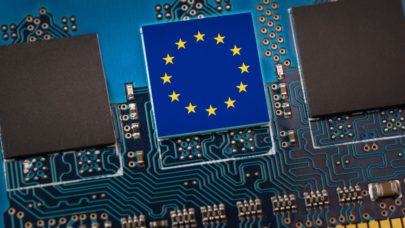
EU Grabs Arm for First Exaflops Supercomputer, x86 Misses Out
October 4, 2023
The configuration of Europe's first exascale supercomputer, Jupiter, has been finalized, and it is a win for Nvidia and a disappointment for x86 chip vendors In Read more…

Intel’s First Products Out of German Fab Could be HPC Gear
June 2, 2022
The first products out of Intel's new factories in Germany, which will start operations between 2025 and 2027, will be for high-performance computing. “We're eager to have the first products out for the German fab to be servicing or HPC customers. So, we're doing that,” said Jeff McVeigh, vice president and general manager of Intel's supercomputing group... Read more…

EuroHPC Issues Calls for Quantum Computers, System Upgrades
April 1, 2022
Last September, the EU’s EuroHPC Joint Undertaking was budgeted through 2027, announcing a slew of major goals for that timeframe. Among them: quantum computi Read more…

European Chips Act Aims to Establish EU Semiconductor Sovereignty
February 10, 2022
One of the farthest-reaching and longest-lasting impacts of the Covid-19 pandemic has been its impact on the global supply chain—a massive disruption that has increased scarcity, raised prices and introduced delays for a wide variety of products. The impacts have been particularly acute for products that require semiconductors, including everything from gaming consoles and phones to vehicles and healthcare devices. Read more…

The European Processor Initiative’s Ambitious Vision of the Future
September 19, 2019
With the EuroHPC program well underway, much of the European Union’s ambition to be a leader in the exascale era rests with the European Processor Initiative Read more…

European Commission Proposes €9.2 Billion for HPC, AI, and More
June 6, 2018
As a complement to its Digital Single Market strategy, the European Commission today proposed a €9.2 billion investment aimed at increasing the EU’s international competitiveness and developing its digital capabilities. Read more…

PRACE 2017 Annual Report: Exascale Aspirations; Industry Collaboration; HPC Training
May 15, 2018
The Partnership for Advanced Computing in Europe (PRACE) today released its annual report showcasing 2017 activities and providing a glimpse into thinking about Read more…

EU Funds 20 Million Euro ARM+FPGA Exascale Project
September 7, 2017
At the Barcelona Supercomputer Centre on Wednesday (Sept. 6), 16 partners gathered to launch the EuroEXA project, which invests €20 million over three-and-a-half years into exascale-focused research and development. Led by the Horizon 2020 program, EuroEXA picks up the banner of a triad of partner projects — ExaNeSt, EcoScale and ExaNoDe — building on their work... Read more…

- Click Here for More Headlines

Whitepaper
Transforming Industrial and Automotive Manufacturing
In this era, expansion in digital infrastructure capacity is inevitable. Parallel to this, climate change consciousness is also rising, making sustainability a mandatory part of the organization’s functioning. As computing workloads such as AI and HPC continue to surge, so does the energy consumption, posing environmental woes. IT departments within organizations have a crucial role in combating this challenge. They can significantly drive sustainable practices by influencing newer technologies and process adoption that aid in mitigating the effects of climate change.
While buying more sustainable IT solutions is an option, partnering with IT solutions providers, such and Lenovo and Intel, who are committed to sustainability and aiding customers in executing sustainability strategies is likely to be more impactful.
Learn how Lenovo and Intel, through their partnership, are strongly positioned to address this need with their innovations driving energy efficiency and environmental stewardship.
Download Now
Sponsored by Lenovo
Whitepaper
How Direct Liquid Cooling Improves Data Center Energy Efficiency
Data centers are experiencing increasing power consumption, space constraints and cooling demands due to the unprecedented computing power required by today’s chips and servers. HVAC cooling systems consume approximately 40% of a data center’s electricity. These systems traditionally use air conditioning, air handling and fans to cool the data center facility and IT equipment, ultimately resulting in high energy consumption and high carbon emissions. Data centers are moving to direct liquid cooled (DLC) systems to improve cooling efficiency thus lowering their PUE, operating expenses (OPEX) and carbon footprint.
This paper describes how CoolIT Systems (CoolIT) meets the need for improved energy efficiency in data centers and includes case studies that show how CoolIT’s DLC solutions improve energy efficiency, increase rack density, lower OPEX, and enable sustainability programs. CoolIT is the global market and innovation leader in scalable DLC solutions for the world’s most demanding computing environments. CoolIT’s end-to-end solutions meet the rising demand in cooling and the rising demand for energy efficiency.
Download Now
Sponsored by CoolIT
Advanced Scale Career Development & Workforce Enhancement Center
Featured Advanced Scale Jobs:
HPCwire Resource Library
HPCwire Product Showcase
© 2024 HPCwire. All Rights Reserved. A Tabor Communications Publication
HPCwire is a registered trademark of Tabor Communications, Inc. Use of this site is governed by our Terms of Use and Privacy Policy.
Reproduction in whole or in part in any form or medium without express written permission of Tabor Communications, Inc. is prohibited.
























